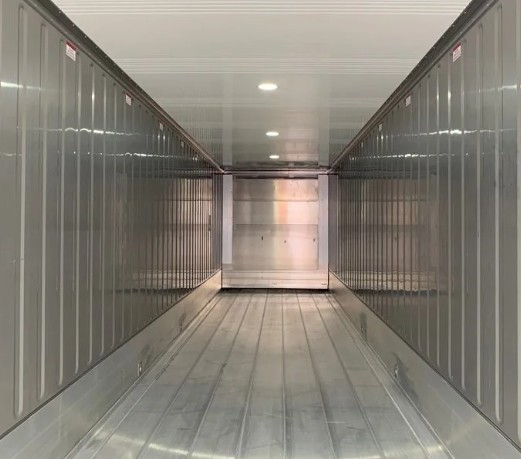What Is an Insulated Shipping Container? (And How It Differs from Refrigerated Containers)
An insulated shipping container is a storage solution designed to protect goods from extreme temperature fluctuations. Unlike refrigerated shipping containers, which have active cooling systems, insulated containers rely on thick insulated walls to maintain stable internal conditions. These containers are ideal for storing temperature-sensitive items, such as dry food, equipment, and materials that need protection from heat or cold. Whether you’re a business owner, farmer, or need extra storage, understanding how insulated shipping containers work can help you determine if they are the right insulated storage container for your needs.

How Does an Insulated Shipping Container Work?
Insulated containers are built with high-quality insulation materials, such as polyurethane foam, which reduces heat transfer between the inside and outside environment. Unlike reefer containers, which require an active refrigeration unit, insulated containers use passive insulation to help maintain consistent temperatures for extended periods. This makes them a more energy-efficient alternative to refrigerated containers for long-term cold-chain logistics.
Key Features of Insulated Shipping Containers:
- Thick Insulated Walls: Helps maintain stable temperatures and prevents temperature fluctuations.
- Humidity Control & Ventilation: Ensures that moisture levels remain stable, preventing mold and damage to stored items.
- Durability & Weather Resistance: Built from corrosion-resistant materials, including stainless steel sheeting, to withstand extreme climates.
- Energy Efficiency: Does not require an external power source, unlike refrigerated containers, making it cost-effective.
- Flexible Storage Use: Suitable for a variety of industries, from food storage to industrial storage solutions.
Common Uses of Insulated Shipping Containers
Insulated containers are widely used across industries that require protection from ambient temperature changes:
Food and Beverage Industry
- Storage of dry goods and non-perishable food items.
- Protection of products from heat and humidity control during transport.
- Alternative to perishable shipping containers for goods that do not require freezing.
Industrial and Equipment Storage
- Safe housing of machinery, electronics, and temperature-sensitive items.
- Protection against corrosion, moisture resistance, and extreme weather conditions.
Agricultural Industry
- Storage for harvested crops, animal feed, and farming tools.
- Maintaining stable conditions for seed storage and insulated cargo container use.
Construction and Commercial Applications
- Secure storage for construction materials, paints, and adhesives.
- Temporary insulated storage units for job sites needing protection from extreme weather.
Types of Insulated Shipping Containers
Standard Insulated Containers
- Available in 20-foot containers and 40-foot containers.
- Provides reliable temperature control without an active cooling system.
High Cube Insulated Containers
- Offers extra height for bulkier items requiring additional storage space.
- Ideal for businesses needing efficient cold-chain logistics solutions without refrigeration.
Modified Insulated Containers
- Can be equipped with ventilation, shelving, and temperature monitoring for added functionality.
- Used for long-term storage solutions in industries requiring stable environments.
Benefits of Using an Insulated Shipping Container
- Maintains Temperature Stability: Prevents extreme heat or cold from affecting stored goods.
- Versatile Storage Solution: Suitable for industrial storage, commercial, and agricultural use.
- Energy Efficient & Cost-Effective: No need for a power source, reducing energy consumption.
- Highly Durable: Designed for long-term storage in demanding environments with insulation thickness optimized for protection.
- Protects Against Condensation & Humidity: Helps prevent mold and material degradation with proper sealing.
Insulated vs. Refrigerated Shipping Containers: What’s the Difference?
While both insulated containers and refrigerated containers help control temperature consistency, they serve different purposes:
- Refrigerated containers (reefers) actively regulate temperatures with a refrigeration unit and require a power source.
- Insulated containers use insulated walls to passively maintain a stable temperature, protecting goods from extreme external conditions.
- Insulated containers are low-maintenance, energy-efficient, and more cost-effective than reefers for long-term storage of temperature-sensitive items.
FAQ's
How long can an insulated shipping container maintain a stable temperature?
While insulated containers do not actively cool or heat, they can maintain stable temperatures for extended periods depending on insulation materials and external conditions.
Can I use an insulated container for food storage?
Yes! Insulated shipping containers are commonly used to store non-perishable food and dry goods, protecting them from extreme temperatures.
What is the difference between refrigerated and insulated containers?
- Refrigerated containers (reefers) have active cooling systems to regulate internal temperatures.
- Insulated containers rely on insulated walls and hybrid insulation systems to help maintain temperature without refrigeration.
Where can I buy an insulated shipping container?
Companies like UC Containers offer a variety of used insulated shipping containers for sale. Visit UC Containers for more information on insulated storage solutions.
Why Choose an Insulated Shipping Container Over a Refrigerated One?
Refrigerated containers offer active temperature regulation, making them ideal for frozen goods but requiring constant power and maintenance. Insulated containers, on the other hand, provide a low-maintenance, cost-effective storage solution for products that need protection from temperature fluctuations without needing refrigeration. If you need long-term, durable, and energy-efficient storage, an insulated conex box is the perfect choice.
Final Thoughts
An insulated shipping container is a practical and cost-effective solution for businesses needing temperature stability without the high costs of refrigeration. Whether for food storage, agriculture, industrial equipment, or commercial storage, an insulated container offers protection against extreme weather and humidity. If you’re looking for a reliable storage solution, reach out to UC Containers for high-quality insulated shipping containers for sale, designed for cold-chain shipping containers and perishable shipping containers alternatives.
Internal Links to Explore Further
- What are standard shipping container sizes?
- How Much Weight Can a Shipping Container Hold?
- Difference Between 20ft and 40ft Shipping Containers: Which One Is Right for You?
- High Cube vs Standard Shipping Container: Which One Fits Your Needs Best?
- Shipping Container Door Options: What Are the Best Alternatives to Side-Door Containers?
- Best Materials for Shipping Container Walls – A Comprehensive Guide for Your Container Conversion Project
- 20ft shipping container: A full guide
- 40ft Standard Container: A full guide
- Shipping Container Flooring Options: Best Materials for Durability and Safety
- Shipping Container Ventilation Requirements – A Comprehensive Guide for the US Market
Get quote!

No strings attached 💯